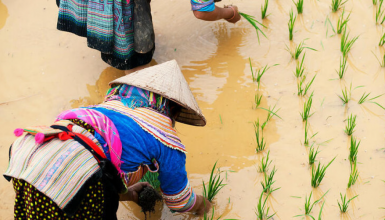
Patricia Espinosa, Executive Secretary of the UNFCCC, speaking at the opening of FWG 6 stated that COP 26 was "an opportunity to strengthen our historic alliance with indigenous peoples and local communities working alongside Parties to address climate change."
For over two years, the Facilitative Working Group (FWG) of the Local Communities and Indigenous Peoples Platform (LCIPP) has worked to strengthen the engagement of indigenous peoples and local communities for biodiversity conservation and climate change mitigation and adaptation.
Hindou Oumarou Ibrahim, co-chair of the FWG, stated: "To avoid dangerous anthropogenic climate change and realize the objectives of the Paris Agreement, the global community urgently needs to reorient how we interact with nature".
She continued, "The LCIPP provides an open and inclusive space for Parties to collaborate with indigenous peoples and local communities to elevate climate change action and ambition for the long-term health and wellbeing of people and nature."
Alok Sharma, COP 26 President, highlighted his commitment to collaborating with indigenous peoples and local communities, stating: "I want to make clear: I will absolutely ensure that the voices of indigenous peoples are hear loud and clear. It is vital that happens."
During COP 26, the LCIPP held two parts of its first annual gathering of knowledge holders. Through this kind of direct interaction with knowledge holders, Parties heard about ways to enhance sustainable and resilient practices that contribute to the objectives of the Convention and the Paris Agreement. Such practices can also help reverse biodiversity decline.
At COP 26, indigenous peoples and local communities exchanges experiences with Parties about ways to address climate change, including during the LCIPP events. These discussions brought people from all over the world, both in person and virtually to discuss their experiences in an effort to build and climate-resilient world for all.
Andrea Carmen, member of the FWG, emphasized: "Proposals for solutions by indigenous peoples need to be taken on board and we're starting to see that process through this body. The UNFCCC is a model for other UN bodies: The UNFCCC has leaped ahead."
Clement Yow Mulalap, member of the FWG, explained: "The overall purpose of the LCIPP is to enhance the engagement of indigenous peoples and local communities in the process of the Convention." The LCIPP helps harness the power of diverse knowledge systems to inform the design and implementation of climate policies and actions.
Background
Between 2020-2021, the FWG has implement the LCIPP initial two-year workplan. The activities of this two-year workplan facilitated exchange between Parties, indigenous peoples and local communities around experiences with mitigation and adaptation to climate change. The FWG also enhanced engagement of indigenous peoples and local communities with the work of other constituted bodies as well as with relevant organizations outside the Convention.
The 6th meeting of the FWG (FWG 6) took place Glasgow from 28-30 October 2021, just days before COP 26. The FWG 6 meeting was open to all contributors of the LCIPP and livestreamed to the general public. Watch the full session here. The FWG is comprised of seven representatives of indigenous peoples organizations across the UN indigenous socio-cultural regions and seven Party representatives.


